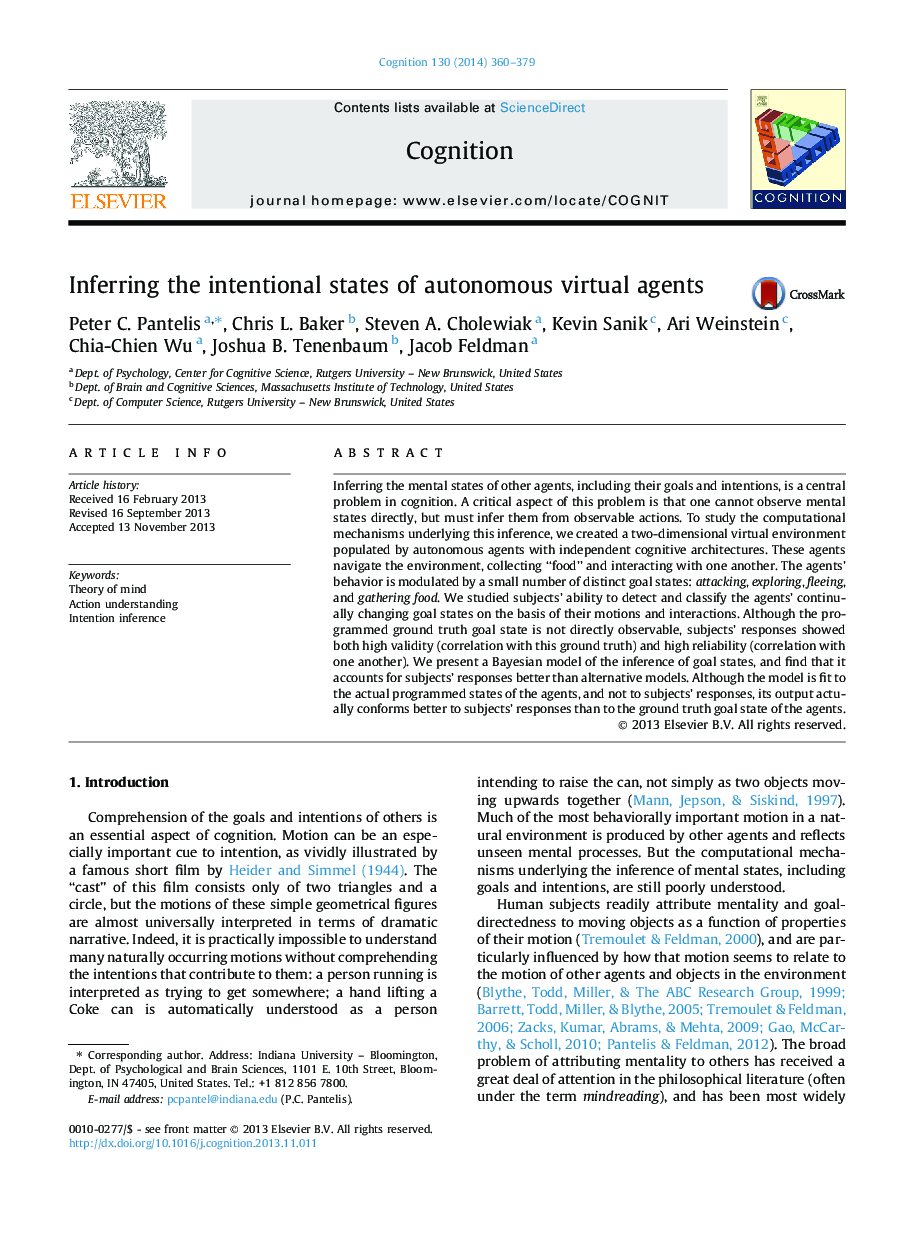| کد مقاله | کد نشریه | سال انتشار | مقاله انگلیسی | نسخه تمام متن |
|---|---|---|---|---|
| 7287690 | 1474134 | 2014 | 20 صفحه PDF | دانلود رایگان |
عنوان انگلیسی مقاله ISI
Inferring the intentional states of autonomous virtual agents
ترجمه فارسی عنوان
کشف حالت های عمدی عوامل عامل مجازی
دانلود مقاله + سفارش ترجمه
دانلود مقاله ISI انگلیسی
رایگان برای ایرانیان
کلمات کلیدی
نظریه ذهن، درک عملی استدلال استدلال،
ترجمه چکیده
کشف حالت های ذهنی عوامل دیگر، از جمله اهداف و قصد های آنها، یک مشکل مرکزی در شناخت است. جنبه بحرانی این مشکل این است که فرد نمیتواند حالتهای ذهنی را مستقیما مشاهده کند، اما باید آنها را از اقدامات قابل مشاهده به دست آورد. برای مطالعه مکانیسم های محاسباتی که اساس این استنتاج است، ما محیط مجازی دو بعدی را که توسط عوامل مستقل با معماری شناختی مستقل تشکیل شده است ایجاد می کنیم. این عوامل به محیط زیست حرکت می کنند، جمع آوری مواد غذایی و تعامل با یکدیگر. رفتار عامل ها توسط تعداد کمی از مقاصد هدف مشخص می شود: حمله، کاوش، فرار و جمع آوری غذا. ما توانایی افراد را در شناسایی و طبقه بندی مأموریت های دائمی در حال تغییر اهداف بر مبنای حرکات و تعاملات آنها مطالعه کردیم. اگرچه هدف هدف حقیقت زمین برنامه ریزی شده قابل مشاهده نیست، اما پاسخ های افراد هر دو اعتبار بالا (همبستگی با این حقیقت زمین) و قابلیت اطمینان بالا (همبستگی با یکدیگر) را نشان می دهد. ما یک مدل بیزی برای استنتاج دولتهای هدف ارائه می دهیم و دریافت می کنیم که پاسخ های افراد نسبت به مدل های جایگزین بهتر است. اگر چه مدل مناسب وضعیت های برنامه ریزی شده عامل ها و نه پاسخ های افراد است، اما خروجی آن به طور واضحی نسبت به واکنش های افراد نسبت به حالت هدف واقعی حقوقی عامل ها مطابقت دارد.
موضوعات مرتبط
علوم زیستی و بیوفناوری
علم عصب شناسی
علوم اعصاب شناختی
چکیده انگلیسی
Inferring the mental states of other agents, including their goals and intentions, is a central problem in cognition. A critical aspect of this problem is that one cannot observe mental states directly, but must infer them from observable actions. To study the computational mechanisms underlying this inference, we created a two-dimensional virtual environment populated by autonomous agents with independent cognitive architectures. These agents navigate the environment, collecting “food” and interacting with one another. The agents' behavior is modulated by a small number of distinct goal states: attacking, exploring, fleeing, and gathering food. We studied subjects' ability to detect and classify the agents' continually changing goal states on the basis of their motions and interactions. Although the programmed ground truth goal state is not directly observable, subjects' responses showed both high validity (correlation with this ground truth) and high reliability (correlation with one another). We present a Bayesian model of the inference of goal states, and find that it accounts for subjects' responses better than alternative models. Although the model is fit to the actual programmed states of the agents, and not to subjects' responses, its output actually conforms better to subjects' responses than to the ground truth goal state of the agents.
ناشر
Database: Elsevier - ScienceDirect (ساینس دایرکت)
Journal: Cognition - Volume 130, Issue 3, March 2014, Pages 360-379
Journal: Cognition - Volume 130, Issue 3, March 2014, Pages 360-379
نویسندگان
Peter C. Pantelis, Chris L. Baker, Steven A. Cholewiak, Kevin Sanik, Ari Weinstein, Chia-Chien Wu, Joshua B. Tenenbaum, Jacob Feldman,
